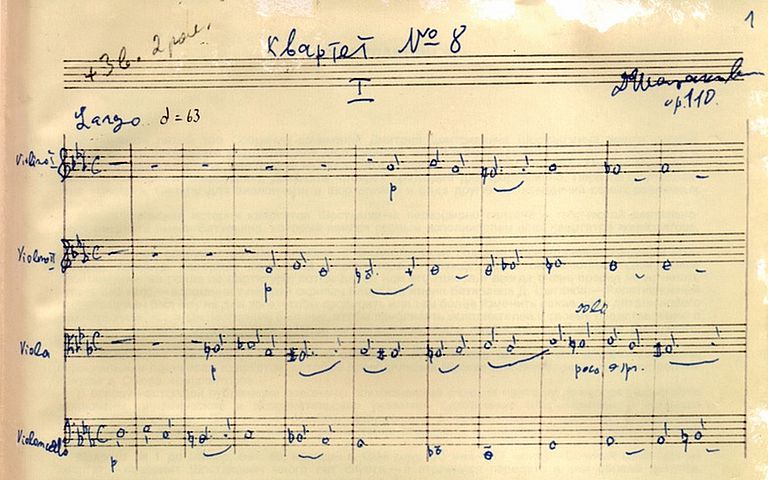String Quartet No. 8 in C minor, Op. 110
Dmitri Shostakovich dedicated the eighth string quartet "In memory of the victims of fascism and war". This official text, which has not yet appeared in the manuscript and which was only added later, has often been associated with Shostakovich's impressions of the destroyed city of Dresden in 1960. Today we know that the work - despite Shostakovitch's sympathy for Dresden and its tragic history - has a much more personal background.
Shortly before he started his trip to Dresden, Shostakovich had entered the CPSU under external pressure because he wanted to be appointed chairman of the Composers' Association of the Russian Soviet Federative Socialist Republic. He himself saw this as a severe moral defeat, which resulted in a nervous breakdown and thoughts of suicide. Against this background, he composed while in Gohrisch, an extremely tragic, personal work instead of the planned film music for "Five Days - Five Nights", which - as emerges from a letter to Isaak Glikman from July 19, 1960, published many years after his death - he understood as a “requiem” for itself:
"... No matter how hard I have tried to do the work for the film in draft form, so far, I haven't been able to. And instead, I wrote a quartet that was of no use and ideologically reprehensible. I thought that should I ever die, hardly anyone will write a work dedicated to my memory. That’s why I decided to write something like this myself. You could also write on its cover: 'Dedicated to the memory of the composer of this quartet'."
Shostakovich emphasized the autobiographical character - as in other works - by using the tone sequence d-s-c-h (the musical equivalent of his initials D. Sch.), which opens the work meaningfully. In addition, there are quotes from his own as well as from foreign compositions in all movements. The cyclical arrangement of the 20-minute work is characteristic, its five movements seamlessly merging: they lead from an opening Largo to two fast movements - an aggressive Allegro molto and a subtle Allegretto Scherzo - with two Largo movements back to the dark initial mood.
In his letter to Glikman, quoted above, Shostakovich continued to write in the ironic tone typical of him: "The fundamental theme of the quartet is the musical notation D. Es. C.H., my initials (D. Sch.). In the quartet, themes from my compositions and the revolutionary song "Tormented by heavy bondage" are related. The following of my topics: from the 1st symphony, the 8th symphony, from the [2nd Piano-] trio, the [1st] cello concerto from the [opera] 'Lady Macbeth'. There are hints of Wagner (funeral march from the 'Götterdämmerung') and Tchaikovsky (2nd theme of the 1st movement of the 6th symphony) related. Oh yes: I forgot my 10th symphony. A nice mishmash. This quartet is such a pseudo-tragedy that I shed as many tears while composing as you drop water after half a dozen beers. When I got home, I tried to play it twice and the tears came again. But this time not only because of its pseudo-tragedy, but also because of my amazement at the wonderful unity of its shape."
The eighth string quartet was premiered on October 12, 1960 in Leningrad by the Beethoven Quartet, Shostakovich's preferred quartet formation. Today it is the composer's most played quartet and is considered his most personal musical document.
Rudolf Barschai's arrangement of the quartet for string orchestra, which was "authorized" by Shostakovich and included in his own catalogue as "Chamber Symphony, Opus 110a”, also became famous.
